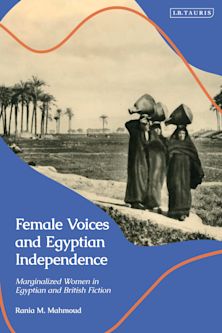- Home
- ACADEMIC
- Middle East
- North African Studies
- Bread, Freedom, Social Justice
Bread, Freedom, Social Justice
Workers and the Egyptian Revolution
Bread, Freedom, Social Justice
Workers and the Egyptian Revolution
This product is usually dispatched within 3 days
- Delivery and returns info
-
Free CA delivery on orders $40 or over
You must sign in to add this item to your wishlist. Please sign in or create an account
Description
Accounts of the Arab Spring often focus on the role of youth coalitions, the use of social media, and the tactics of the Tahrir Square occupation. This authoritative and original book argues that collective action by organised workers played a fundamental role in the Egyptian revolution, which erupted after years of strikes and social protests.
Drawing on the authors' decade-long experience of reporting on and researching the Egyptian labour movement, the book provides the first in-depth account of the emergence of independent trade unions and workers' militancy during Mubarak's last years in power, and and their destabilising impact on the post-revolutionary regimes.
Table of Contents
1. From Nasserism to Neoliberalism: A New Amalgam of State and Private Capital
2. The Changing Structure of the Egyptian Working Class in the Neoliberal Era
3. Strikes, Protests and the Development of a Revolutionary Crisis
4. Organisation in the Workplace Before the Revolution: The Nasserist Model in Crisis
5. From Strike Committee to Independent Union
6. The Revolution's Social Soul: Workers and the January Revolution
7. Workers' Organisations Since the Revolution
8. The Crisis of Representation: Workers and Elections
9. Tathir: The Struggle to Cleanse the State
Conclusion: Beyond the Republic of Dreams: Revolutionary Organisation, Democracy and the Question of the State
Product details
| Published | Oct 09 2014 |
|---|---|
| Format | Paperback |
| Edition | 1st |
| Extent | 402 |
| ISBN | 9781780324302 |
| Imprint | Zed Books |
| Dimensions | 216 x 140 mm |
| Publisher | Bloomsbury Publishing |
About the contributors
Reviews
-
In this engaging and immensely readable text, Alexander and Bassiouny confirm their position as two of the most astute observers of Egypt's labour movements. Firmly grounded in recent debates around neoliberalism, capitalism and the Egyptian state - and drawing upon a wealth of fascinating first-hand accounts - this book provides many critical insights into Egyptian workers and their ongoing struggles. It deserves to be very widely read.
Adam Hanieh, SOAS, University of London
-
Here at last is a book on Egypt that acknowledges and traces the pivotal role of the workers in the sequence of events that led to the gigantic uprising of January-February 2011, and the subsequent unfolding of the revolutionary process. In a field dominated by studies focusing exclusively on political movements and state apparatus, this is a most welcome and important contribution
Professor Gilbert Achcar, SOAS, University of London, and author of The People Want: A Radical Exploration of the Arab Uprising
-
This is an intriguing and detailed account of why the role of the working class needs to be put centre stage in understanding the toppling of Hosni Mubarak. The authors provide insight and analytical rigour in documenting and accounting for the growth and dynamism of independent trade unions in "revolutionary" Egypt. A must read for those who want to know how and why the working class is essential to understanding political and economic crisis in Egypt.
Professor Ray Bush, University of Leeds
-
One of the best accounts on the Egyptian revolution, its underlying causes and its aftermath. The book is an accessible and in-depth read for both specialists and non-specialists alike, not only deciphering the workings of one of the most important political events in recent years, but also providing a comprehensive analysis of structural changes in modern Egypt.
Rabab El Mahdi, The American University in Cairo

ONLINE RESOURCES
Bloomsbury Collections
This book is available on Bloomsbury Collections where your library has access.

































